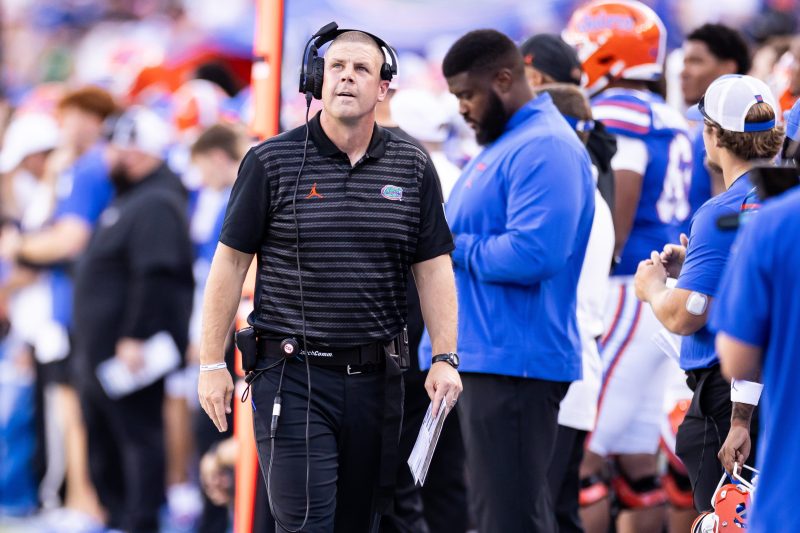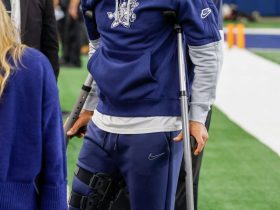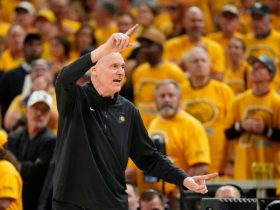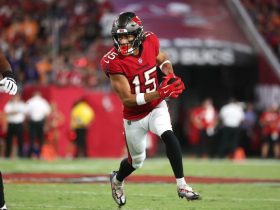Every Saturday, senior national college football writer Matt Hayes breaks down four trending stories, and a 12-team College Football Playoff bracket.
First Down: The Billy Napier experiment is over
A group of Florida boosters have pulled together money to cover the expense of firing coach Billy Napier, two people with direct knowledge of the situation told USA TODAY Sports.
The two spoke on the condition of anonymity because of the sensitivity of the process, which will begin when interim Florida president Kent Fuchs makes an official decision. The only variable is when.
If Florida fires Napier, he will be owed approximately $26 million in buyout money. But that number could be mitigated because Florida is currently being investigated by the NCAA for its recruitment – and Napier’s role in the recruitment –of former high school recruit Jaden Rashada.
Fuchs hired Napier in 2022, and was one of Napier’s biggest supporters before retiring in February of 2023. Fuchs returned in an interim role this summer when Ben Sasse resigned as president.
Fuchs and the Florida administration desperately want Napier to succeed, and have given him everything he would need – financially, structurally, facilities – to do so. But the product on the field has progressively gotten worse, even after Napier promised this offseason that it would be different.
Texas A&M routed the Gators 33-20 Saturday in The Swamp, the second blowout home loss of the season, including the much anticipated season opening 41-17 loss to rival Miami.
The Gators have given up an average of 38 points in their last eight games against power conference opponents.
More damaging: For the second time in as many home games against FBS opponents, fans began filing out of the stadium early in the third quarter. The Aggies started backup quarterback Marcel Reed in place of injured starter Conner Weigman, and still led 20-0 at halftime, and 33-7 midway through the third quarter.
The loss dropped Florida (1-2) to 12-16 in 28 games under Napier, including 7-15 vs. power conference teams. Another losing season — against the nation’s toughest schedule — would be Florida’s fourth in a row for the first time since the World War II era.
Even the emergence of freshman quarterback DJ Lagway wasn’t enough to change the Gators’ fortunes. Florida had 63 yards in the first half, and its possessions ended with three punts and an interception.
Second Down: The fall of Florida State
Let me try to explain, as simply as possible, what in the world is wrong at Florida State?
The Seminoles have 156 yards rushing. For the season.
After three games.
Blame embattled quarterback D.J. Uiagalelei for the woes of the offense, and Florida State’s unthinkable winless start. It’s safe and easy criticism.
But if the Seminoles can’t run the ball, if they’re averaging a measly 2.2 yards per carry, it doesn’t matter who is playing quarterback.
“I challenge all of us,” Florida State coach Mike Norvell said after Saturday’s 20-12 home loss to Memphis. “Everything is under evaluation.”
Start with the offensive line, the crux of the problem. But it’s here where we realize what has made FSU so dangerous under Norvell can also be its greatest weakness.
The transfer portal, everyone, isn’t as bountiful as you think.
It’s full of the unloved and unwanted for a reason, despite what coaches believe they can change. It’s not a magical fix-all.
Especially on the offensive line.
Four of FSU’s top seven offensive linemen are transfers: starting guards Keiondre Jones (Auburn) and Richie Leonard (Florida), starting tackle Jeremiah Byers (Texas-El Paso), and backup guard TJ Ferguson (Alabama).
None of them are productive. In fact, they’ve been a liability.
If you’re an upperclassman offensive lineman from a power conference in the portal, odds are you either weren’t starting at your previous school, or weren’t projected to. You can’t expect to insert castoffs from another school and play at a high level — especially on the offensive line, where it’s all about chemistry and combined playing experience.
FSU had 37 yards rushing on 24 carries against Memphis, 21 yards on 16 carries against Boston College, and 98 yards on 31 carries against Georgia Tech.
And you wonder what’s wrong with the Seminoles?
Third Down: LSU’s next NFL quarterback
While most zeroed in on LSU coach Brian Kelly losing it on the sidelines during a thrilling comeback win at South Carolina, there was a much more impressive sight playing out on the field.
LSU quarterback Garrett Nussmeier continues to develop into an elite thrower. An NFL scout, who spoke to USA TODAY Sports and requested anonymity to protect their team’s draft preparations, said Nussmeier is moving closer to a first-round selection.
“The velocity, the accuracy, the various release points. It’s impressive,” the NFL scout said. “He’s a big, strong guy who stands in there and isn’t afraid to take a hit to get a throw off. There was a ton of adversity in that game, and it didn’t faze him. Just a really impressive performance.”
Nussmeier brought LSU back from a 17-0 deficit, and threw for 285 yards and two touchdowns. He consistently made big third down throws to bring LSU back from deficits throughout the game, including a 29-yard deep throw to wideout Karen Lacy to set up the game-winning touchdown run from Josh Williams.
“A big-time Sunday throw,” the scout said. “They’re down 17, they’re down 14, and he just kept firing. Making big throw after big throw.”
Fourth Down: The loss of Bedlam
Oklahoma and Oklahoma State played footsie Saturday with Tulane and Tulsa, respectively, combining to rout the Group of Five schools 79-29.
Anyone else see a problem here?
Oklahoma and Oklahoma State decided that last year’s Bedlam rivalry game would be the last in the series until, well, who knows?
Why, you ask?
Oklahoma State spite, for one thing (not that there’s anything wrong with that). And Oklahoma’s attitude of we’ve moved on, for another.
But Oregon and Oregon State continued to play their annual rivalry Saturday. So did Washington and Washington State. Conference realignment eliminated the necessity of playing those rivalries, but the four schools played them, anyway.
Oklahoma and Oklahoma State could’ve done the same thing Saturday, but chose instead to play overmatched opponents for guaranteed wins.
SEC commissioner Greg Sankey says he can’t (and won’t) force teams to play rivals, but the SEC and Big 12 should gently nudge the two rivals into playing the game that began in 1904 — when Oklahoma was still a territory and not a state.
The Bracket: Here comes Texas
1. Texas
2. Ohio State
3. Miami
4. Oklahoma State
Memphis (12) at Georgia (5)
Oregon (11) at Alabama (6)
Missouri (10) at Ole Miss (7)
Southern California (9) at Tennessee (8)
Matt Hayes is the senior national college football writer for USA TODAY Sports Network. Follow him on X at @MattHayesCFB.






